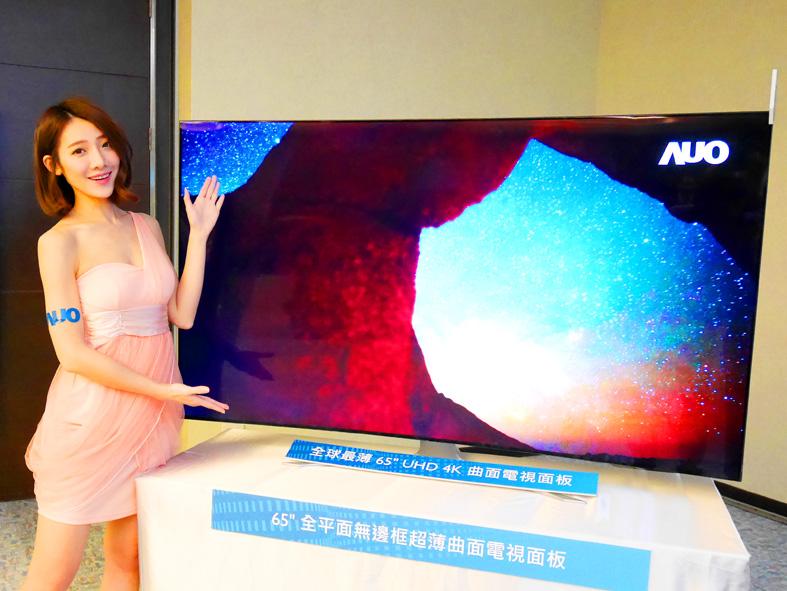Taiwan’s flat-panel industry has emerged from the doldrums thanks to a COVID-19-related surge in demand, the Ministry of Economic Affairs said yesterday.
Production value in the industry last year grew 0.3 percent from 2019, ending two years of declines, the ministry said in a statement.
The local flat-panel industry was affected by oversupply due to Chinese competition in 2018 and 2019, with its production value dropping 16.9 percent annually to NT$725.4 billion (US$25.47 billion at the current exchange rate) in 2019, a 14-year low, ministry data showed.

Photo: Chen Mei-ying, Taipei Times
However, the boom last year due to demand for information and communications technology (ICT) products amid work-from-home and distance-learning trends caused the flat-panel market to recover, the ministry said.
In addition, the local industry’s production value grew 11.2 percent year-on-year in the second half of last year, the largest increase for the period since 2013, it said.
Panels larger than 10 inches provided most of the growth last year, the ministry said.
They accounted for 58.3 percent of total sales and generated production value of NT$424.2 billion, up 4.6 percent from a year earlier, it said.
However, small and medium-sized panels suffered amid a slowdown in the cellphone panel market and US sanctions on Chinese tech firms, with production value decreasing 12.5 percent year-on-year, it said.
China, including Hong Kong, remained the largest shipment destination for Taiwanese flat panels last year, with exports totaling NT$6.92 billion, up 5.3 percent year-on-year, the ministry said.
Exports of flat panels increased 5.3 percent from 2019, while Chinese panel exports contracted 4.7 percent, South Korea’s dropped 5.6 percent and Japan’s fell 6.2 percent, the data showed.
“It is a sign that Taiwanese manufacturers are keen to return and invest in Taiwan,” Department of Statistics Deputy Director-General Huang Wei-jie (黃偉傑) said.
“They are laying the groundwork to manufacture for automotive, medical, e-sports and other higher-value products, which is a positive development for the Taiwanese panel industry,” Huang said.

UNCERTAINTY: Innolux activated a stringent supply chain management mechanism, as it did during the COVID-19 pandemic, to ensure optimal inventory levels for customers Flat-panel display makers AUO Corp (友達) and Innolux Corp (群創) yesterday said that about 12 to 20 percent of their display business is at risk of potential US tariffs and that they would relocate production or shipment destinations to mitigate the levies’ effects. US tariffs would have a direct impact of US$200 million on AUO’s revenue, company chairman Paul Peng (彭雙浪) told reporters on the sidelines of the Touch Taiwan trade show in Taipei yesterday. That would make up about 12 percent of the company’s overall revenue. To cope with the tariff uncertainty, AUO plans to allocate its production to manufacturing facilities in

Taiwan will prioritize the development of silicon photonics by taking advantage of its strength in the semiconductor industry to build another shield to protect the local economy, National Development Council (NDC) Minister Paul Liu (劉鏡清) said yesterday. Speaking at a meeting of the legislature’s Economics Committee, Liu said Taiwan already has the artificial intelligence (AI) industry as a shield, after the semiconductor industry, to safeguard the country, and is looking at new unique fields to build more economic shields. While Taiwan will further strengthen its existing shields, over the longer term, the country is determined to focus on such potential segments as

TAKING STOCK: A Taiwanese cookware firm in Vietnam urged customers to assess inventory or place orders early so shipments can reach the US while tariffs are paused Taiwanese businesses in Vietnam are exploring alternatives after the White House imposed a 46 percent import duty on Vietnamese goods, following US President Donald Trump’s announcement of “reciprocal” tariffs on the US’ trading partners. Lo Shih-liang (羅世良), chairman of Brico Industry Co (裕茂工業), a Taiwanese company that manufactures cast iron cookware and stove components in Vietnam, said that more than 40 percent of his business was tied to the US market, describing the constant US policy shifts as an emotional roller coaster. “I work during the day and stay up all night watching the news. I’ve been following US news until 3am

COLLABORATION: Given Taiwan’s key position in global supply chains, the US firm is discussing strategies with local partners and clients to deal with global uncertainties Advanced Micro Devices Inc (AMD) yesterday said it is meeting with local ecosystem partners, including Taiwan Semiconductor Manufacturing Co (TSMC, 台積電), to discuss strategies, including long-term manufacturing, to navigate uncertainties such as US tariffs, as Taiwan occupies an important position in global supply chains. AMD chief executive officer Lisa Su (蘇姿丰) told reporters that Taiwan is an important part of the chip designer’s ecosystem and she is discussing with partners and customers in Taiwan to forge strong collaborations on different areas during this critical period. AMD has just become the first artificial-intelligence (AI) server chip customer of TSMC to utilize its advanced